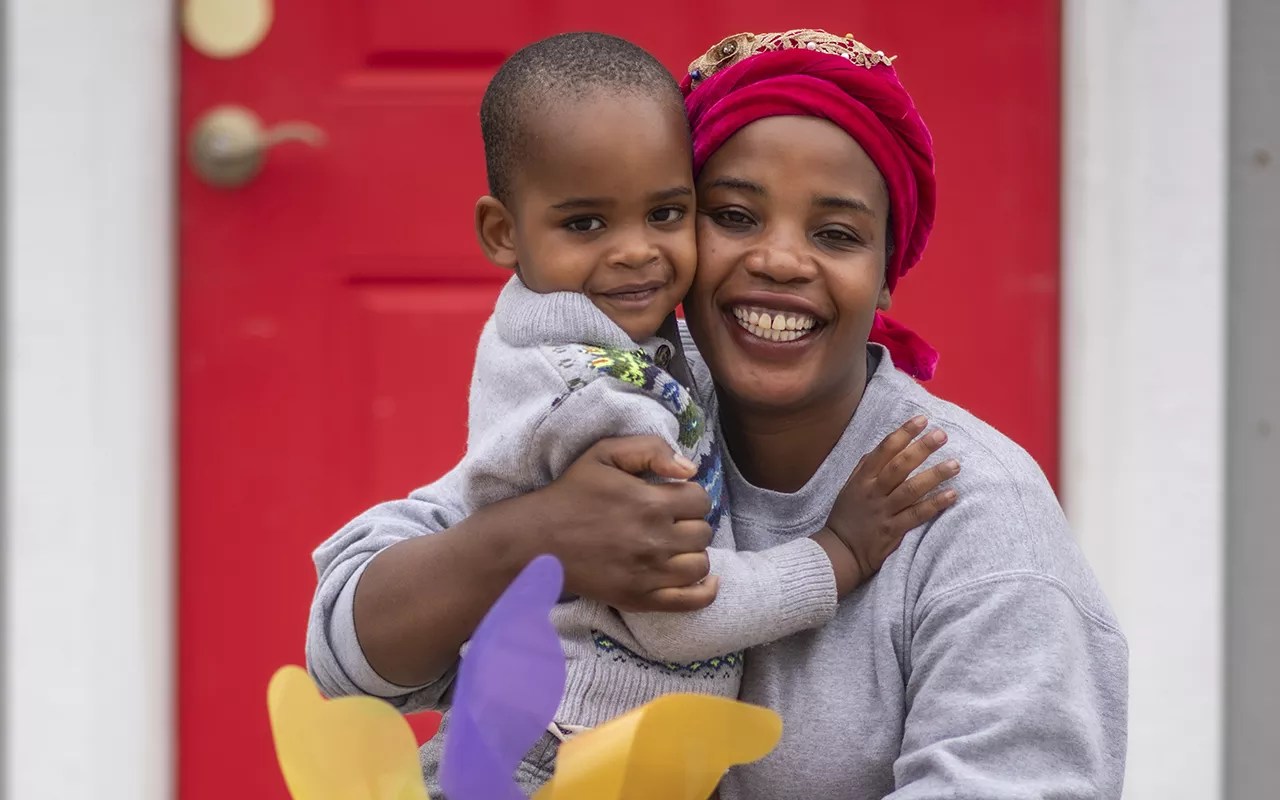
Evan Semón

Audio By Carbonatix
In a crowded room at the Dayton Street Opportunity Center, interpreters began speaking eight different languages every time one of the candidates on the November 7 ballot explained why they were fit to run the city they all called home: Aurora.
“I’m running for mayor because I want all of our residents, all of our immigrant and refugee community, to have an opportunity to have stable housing and to have an income to support their families, themselves and their version of the American dream,” said Juan Marcano, a Democrat on Aurora City Council who’s running to unseat incumbent Mayor Mike Coffman.
As he spoke, interpreters translated his message into Pulaar, Wolof, Nepali, Karen, Spanish, Swahili, Burmese and Rohingya, all languages spoken by some of the eighty people in the room.
The 2023 City of Aurora candidates’ forum on October 26 got off to a rough start, as organizers worked out the logistics of having so many interpreters speaking at once. At first, the room was so noisy that it was hard to hear Marcano, Coffman and a third mayoral candidate, Jeff Sanford. But as the night went on, the interpreters and the candidates struck a balance, with the interpreters speaking quietly and the candidates loudly through the babel of translations.
“We try to do everything we can to help our immigrant and refugee community and make sure they have every opportunity for success,” Coffman told the crowd, citing Aurora’s Natural Helpers program, “where we take leaders from respective immigrant communities, train them in how to access different services and get back into the communities to provide that information.”
After Coffman spoke, moderator Whitney Traylor asked the speakers to “slow down a little bit” and the interpreters to “try to interpret as quiet as you can.”
“This is how it works,” he added. “Democracy is not always clean and simple.”

Aurora’s mayoral candidates discussed their platforms, while interpreters translated into eight languages.
Bennito L. Kelty
Aurora, Colorado’s third-largest city, touts itself as “the world in a city” because of its diverse population, the most diverse in the state.
“Our diversity is a big thing. Our diversity is really unique. We are by far the most diverse city in Colorado. We’re one of the most diverse in the country,” says Coffman. “We always try to capitalize on that. Twenty percent of our overall population was born outside the United States.”
Aurora has a foreign-born population of roughly 87,000 people out of more than 390,000 residents; 160 languages are spoken in the city’s schools, according to Coffman.
“The beauty about this city is that we have some areas of the city with high concentrations of immigrants and refugees,” says Ricardo Gambetta, head of the Aurora Office of International and Immigrant Affairs. “But also, we noticed that we have immigrants and refugees working all over across the city, raising their families all over across the city.”
About 1,600 residents of the city are refugees who have resettled in Aurora.
The “world refugee population” comprises anyone leaving their country, seeking asylum or being resettled in a different country “as a result of persecution, conflict, violence, human rights violations or events seriously disturbing public order,” according to the United Nations.
One of President Jimmy Carter’s last political acts was signing a bill to standardize the system for bringing refugees into the U.S. Until then, refugee resettlement was typically done through charities, private organizations and community groups set up by local institutions such as churches and universities. The 1980 Refugee Resettlement Act standardized the process and funneled resources to official resettlement agencies.
Since then, the U.S. has allowed more than 3.1 million refugees from across the world to stay in this country; nearly 64,000 settled in Colorado.
According to Gambetta, almost 80 percent of the refugees who come to Colorado live in Aurora at some point. In the beginning, it was relatively cheap to live in the city, “and that was the case for many, many years,” he says.
While that may no longer be true, Aurora has other draws. The city recognizes that if it provides information and guidance to newcomers, then “you encourage civic participation,” Gambetta says.
“We want to provide tools, the resources and the information so refugees and immigrants can understand how to navigate the city,” Gambetta adds. “You need legal assistance, you need housing, you need information on how to enroll your kids in school, how to open a checking account, how to ride the bus, how to call the police. We empower them with this information.”
While people fleeing Vietnam and Cambodia comprised the majority of refugees forty years ago, now many of those arriving in Aurora are from Africa. More than 10,000 African refugees have come to the state since 1980; almost 1,700 were from the Democratic Republic of the Congo, leaving a homeland rocked by conflict for thirty years.
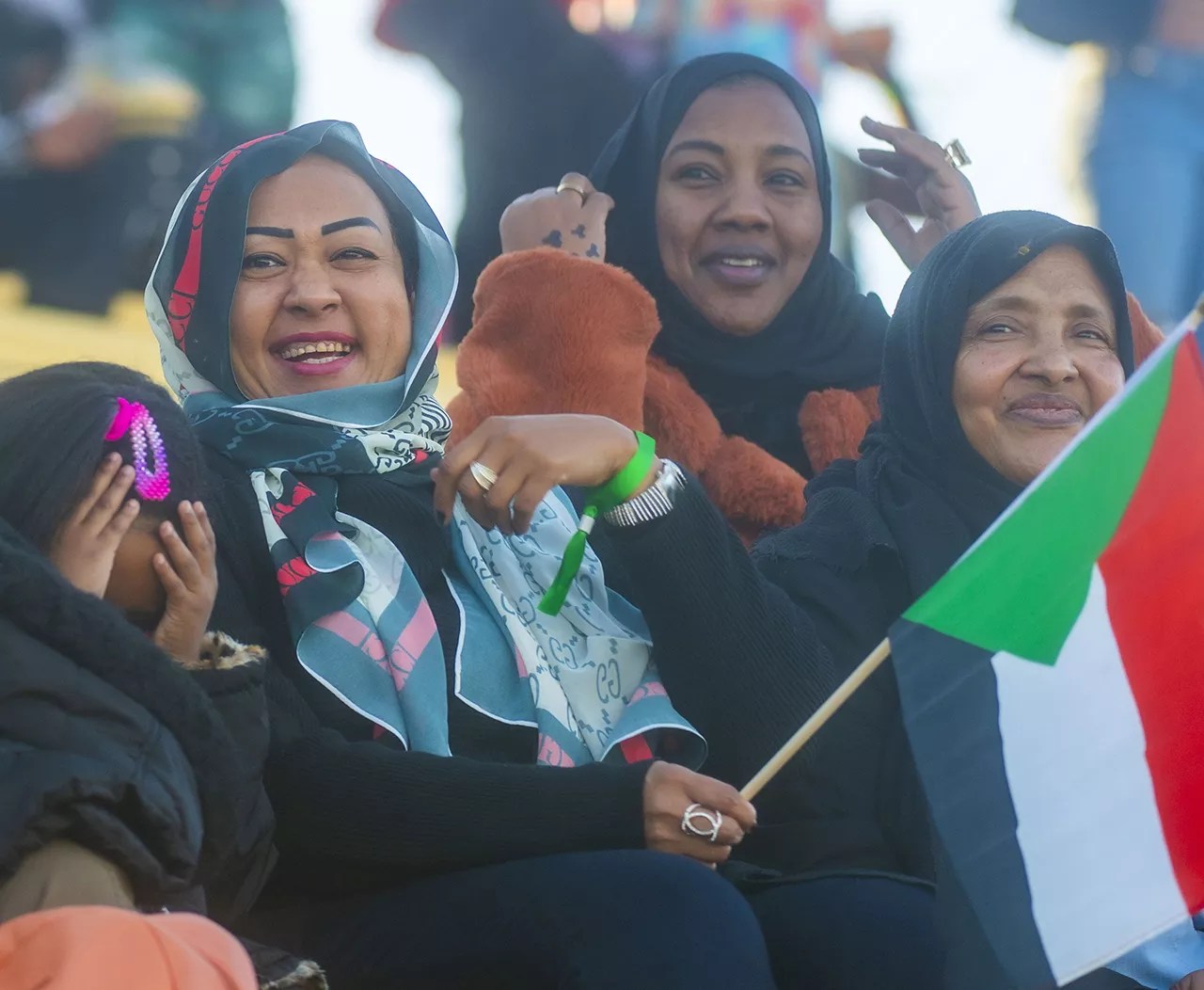
The crowd cheering on the Sudanese and Congolese teams at a soccer match.
Evan Semón
The Swahili translator at the candidate forum was one of the Congolese refugees now living in Aurora.
When she was six years old, Clementine Gasimba’s family fled from their native country, the Democratic Republic of the Congo. It was 1996, and they were escaping fighting that would lead to the Second Congo War, one of the bloodiest conflicts in Africa and one that created hundreds of thousands of refugees.
Gasimba and her family landed at the Gihembe refugee camp, one of the oldest refugee camps in Rwanda, just east of the Congo border; about 15,000 refugees were there at the time.
“It was not easy. Many of us died from hunger, others died of disease, others killed themselves thinking there is nothing going to happen, no future,” Gasimba remembers. “Imagine sitting down all day, you’re doing nothing as a father or mother, the children are doing nothing, they don’t see any example. … We don’t have clothes, we have like one clothes that you wear all the whole year. Life in a refugee camp is not good at all.”
Gasimba “grew up there,” she says, and got her entire education in the camp. It was located on “one big mountain,” and she and her family lived in a tent hardly wider than a sidewalk. “Sometimes you sleep the head inside, the legs outside,” she says, and laughs. “Sometimes, the parents chose to stay up all night so the children can sleep on the mud, on the floor, no mattress, no nothing.”
As the years went on, some of her relatives and other people she knew at the camp chose to go back to Congo, “and they were all killed,” Gasimba says. She and her family stayed in the same tent in the camp for eighteen years while waiting for a country to give them refugee status and take them out of Gihembe.
In 2014, Gasimba was kidnapped from her family and taken to another part of the camp, where she was raped. That year, her family’s refugee status was finally approved by the United States. Eight family members were selected to come to the U.S., including her father, mother and siblings. Gasimba followed two weeks later, 24 and pregnant as a result of the rape.
They all landed in Colorado.
“They just bring you,” Gasimba remembers. “You don’t even know where you are going. They just put you in the flight, and when you reach where you are going, they are like: It’s here.”
“You don’t even know where you are going. They just put you in the flight, and when you reach where you are going, they are like: It’s here.”
Gasimba and her family were resettled through Lutheran Family Services, a local nonprofit that is one of three refugee resettlement agencies in Aurora, along with the African Community Center and the International Rescue Committee, the oldest resettlement agency in the U.S., created by Albert Einstein in the 1940s.
“They showed me where I’m going to live, where I can buy food, things like that,” she recalls. “They are very helpful. They work closely with you for the first three months that you are here.”
Before Gasimba arrived in Colorado, Lutheran Family Services had located housing for her parents and siblings in Aurora. The agency found her a unit in Wheat Ridge, but with a daughter on the way, she set her sights on moving closer to her parents.
In the meantime, she started busing to the Emily Griffith Technical College in Denver for English classes. She spent two years taking classes, even though she already knew some English, along with a handful of other languages she’d picked up in the camp. “I don’t have a first language,” she laughs. “I speak six languages. The most I use is Swahili and Kinyarwanda and English.”
The other three are French, Kirundi and Lingala. As she lists them, she remembers: “I also speak Orunyankore a little bit and a little bit of Spanish.”
Lutheran Family Services, like other resettlement agencies, only assisted with her integration for three months. Then “you’re on your own,” she says. “You start going to work, go to school, just to help yourself.”
In 2018, she and her daughter were finally able to rent an apartment in north Aurora, near Colfax and Yosemite Street, much closer to her parents. Wheat Ridge “didn’t have what they have here in Aurora,” she recalls. She noticed that her new home “had a lot of people like me, refugees from Africa. When we came to the U.S., we said goodbye to our families like we would never see them again. It was a very big surprise to see people from my country, from refugee countries, in Aurora.”
And Aurora “had my food,” she adds, like fufu, which she describes as “a kind of cornmeal,” and manihot, also known as cassava or yuca. She started shopping at two grocery stores: the Global Grocery Mart, which is Somalian, and the IWACU African Grocery, which is Rwandan.
“Everything, it seems normal,” she says. “When we come here, we think we are coming to another country.”
Gasimba feels that “everybody is welcome” in the U.S. and particularly Aurora, and she tries to be the same way. “I’m very friendly, so anybody who wants to stay with me, we will stay together and we will be friends,” she says. “I don’t select people. I have so many Mexican friends. When I go to work, I make friends. Anything in common, I make friends. I have a lot of friends.”
She now works with the Village Institute, a nonprofit that opened in May 2020 – in the middle of the COVID pandemic – to offer child care and early education to refugees and immigrants. “It was difficult for me to leave my children and go to work, get them child care,” Gasimba recalls. “When I go, I go with him,” she says, pointing to her son, who was born in 2021, shortly after she took the job.
She credits the Village Institute with “making me meet so many people, different kinds of people. … We go and teach people about COVID vaccines, about health issues, finding food. We’re doing so many things. That organization also connected me to so many people.”
Among them were people involved with the East Colfax Community Collective, also known as EC3, an Aurora advocacy group that focuses on housing and tenants’ rights. In March 2022, members of EC3 asked if she’d be interested in volunteering as an interpreter. She was.
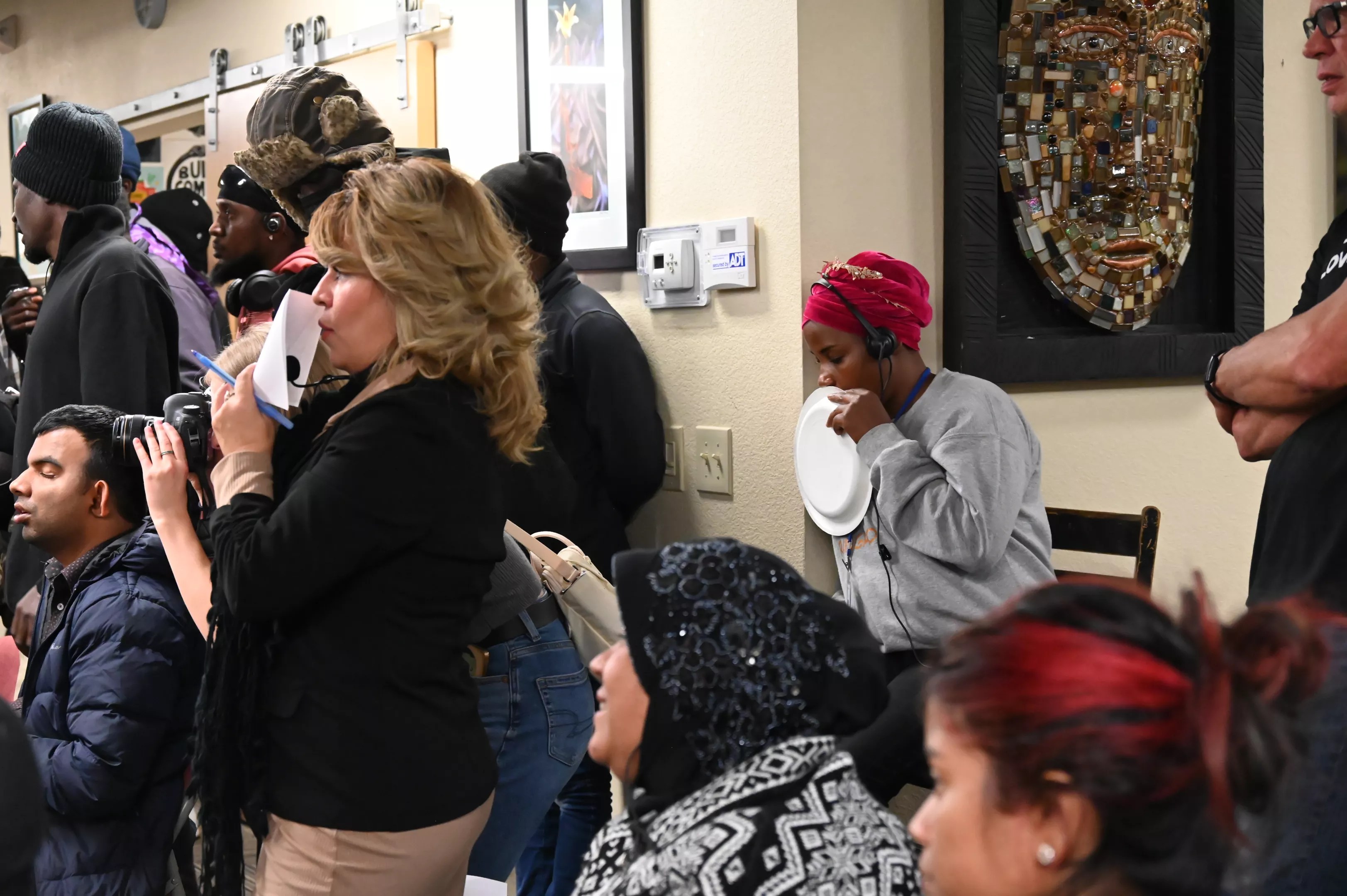
Eight interpreters helped translate remarks by candidates at a political forum.
Bennito L. Kelty
While interpreting for EC3, she heard stories from African refugees about their housing falling apart and negligent landlords. People complained that their banisters were loose, their heating and cooling systems weren’t working, their ceilings were leaking and their homes were moldy.
“For many people, the worms start coming in the house. The house is very stinky, it’s no longer livable,” she says. “You call the landlord, you start doing whatever you can, but no one’s answering. And then when they answer, they say, ‘We’re coming, we’re coming,’ for two, three weeks.”
Gasimba had dealt with similar issues; the air conditioning and heating don’t work in her apartment, and it gets so hot that her little boy can’t stand wearing clothes in summer months. “Imagine him spending all day naked because he’s too hot and he can’t handle the heat. That is not something good,” she says. And when it’s cold, “I have to put over me like three blankets.”
Making matters worse, the ceiling drips water from the upstairs neighbor’s pipes. “It’s so hard here in Aurora,” she says. “If your toilet is working, the shower is not working. If the shower is working, the fan is not working, the heat.”
After listening to immigrant after immigrant with the same issues, she says she realized that “I could advocate for these people. I feel what tenants feel and what the disaster is they go through. Particularly in Aurora, the houses are very old, and the landlords are not doing anything.”
But for many of those who spent much of their life in the stagnant world of a refugee camp, it can be hard to find the motivation to do something. “When they get here, they don’t want to go to work,” Gasimba says. “Some of them are going to the drugs. They don’t think about having a life, having a future. I think there’s a consequence to staying longer in the refugee camps, because if you don’t see somebody working, how will you know how to work? How will you think of the future?”
After all, her native country “is still on fire. They’re still fighting,” Gasimba says. She has aunts and uncles living in the refugee camp in Rwanda; her parents are trying to bring them to Colorado. Gasimba stays in touch with her relatives in Africa on WhatsApp, usually sending messages in Kinyarwanda and sometimes in Swahili.
In her free time, she likes to cook, dance and watch films with her two kids inside their home. She also likes to take them to visit different parks around Aurora; their favorite spot is the garden outside the Martin Luther King Jr. Library.
When she sees homeless individuals on the streets of Aurora and Denver, she thinks of her life in the refugee camp, remembering how she used to sleep on the cold, hard mud. “It was like that,” she says. “And I think about that, and I pray for them.”
Despite the challenges, she enjoys living here. “I like the country,” she says. “It’s beautiful. If I don’t become lazy, I can make money. I can take my children to school. I’m not going to die of hunger. I have food, clean water, things like that. So I’m grateful for being here.”
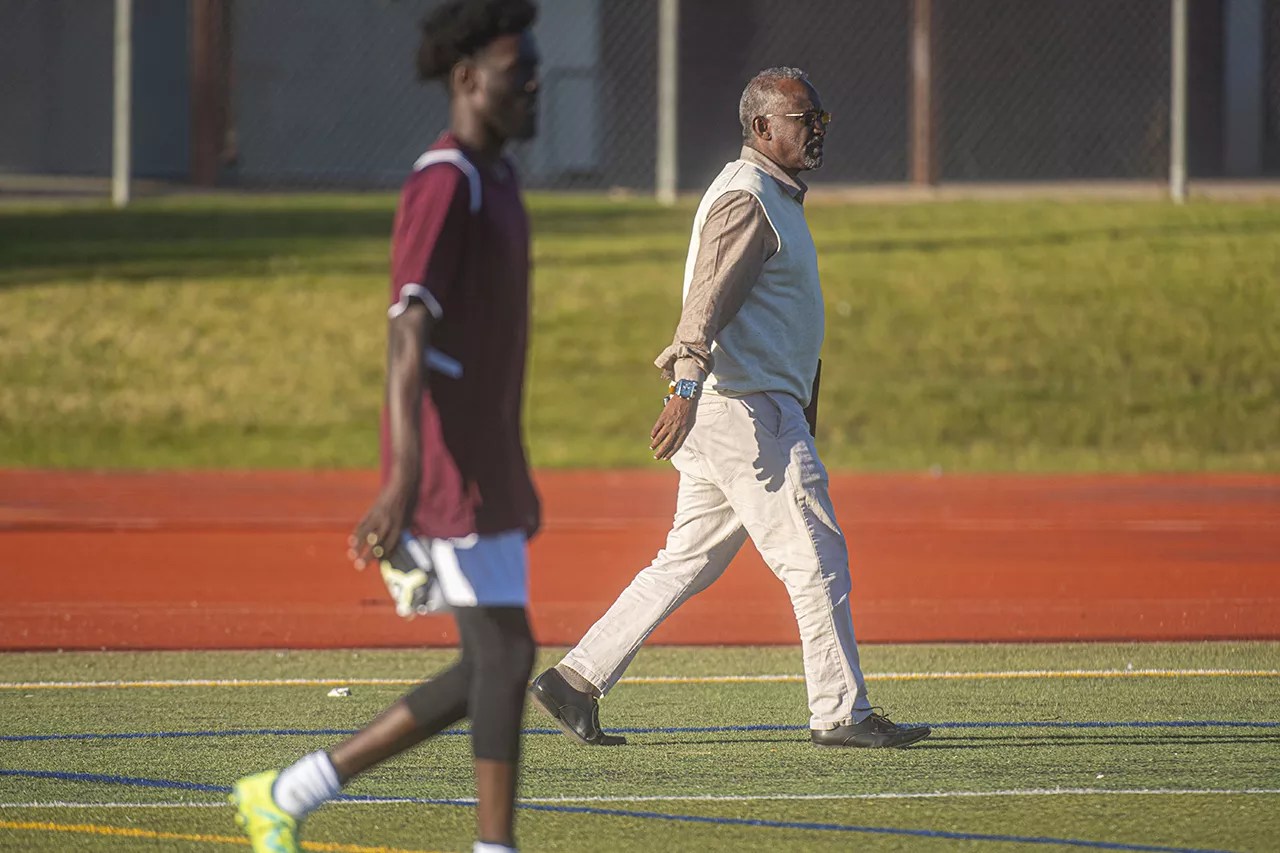
Ibrahim Onosa (right) fled Sudan and landed in Aurora, where he’s started both a business and a soccer league.
Evan Semón
Many refugees now living in Aurora fled another African country, Sudan. More than 1,200 Sudanese have resettled in Colorado; many left their homeland after 1989, when an Islamic regime led by Omar al-Bashir, a former military officer, ousted the democratically elected government that had been voted in only a few years earlier.
While al-Bashir was fighting to hold on as president, Ibrahim Onosa left Port Sudan, the coastal city where he was born and raised, to study science and technology at the University of Gezira. When he graduated in 1992, he moved to the capital city of Khartoum with his wife, Ala, but “life was very difficult to stay there,” he recalls. That’s because Onosa had been “active against the government” as al-Bashir came to power, protesting on campus and joining the Democratic Unionist Party, one of Sudan’s oldest political parties.
“They start kicking out everyone who is not supporting them,” Onosa says. “The government we had from ’89 to a couple years ago, if you don’t belong to the government, they cannot survive in Sudan.”
The government was cracking down on activists, unions, professors and non-Muslims. “When we graduated, there were no jobs,” he says. “And it was not peaceful. There was war everywhere except the capital.”
Although Onosa and his wife found safety in Khartoum, “I was spending most of my time sitting, looking around,” he says. The realization sank in that “I don’t have any money, and I don’t have any future, and there is no way for me to make my own future.”
He finally decided he had to leave the country, but “it wasn’t easy,” he recalls. “You have to find your way. Almost all of us had to find a sneaky way to leave the country.”
His family gave him money to take a bus to the border, where he bribed Sudanese officials so that he could continue on to Cairo, the capital of neighboring Egypt, where he lived for a couple of years. “I stayed there, and I applied as a refugee,” he says. “And they gave me a chance to go to Canada or the United States or Australia during that time.”
He was told that his chances were better if he picked the U.S., but he had to stay in Cairo while his application was reviewed. In 2000, the U.S. finally approved Onosa for refugee status. He came by himself, with the intention of working and saving money to bring his wife.
He landed in Dallas. “I felt like it wasn’t very welcoming at that time,” he says. “For me to adjust as a new refugee, it wasn’t easy in Texas.”
Another refugee from Sudan, a friend who was living in Aurora, told him to “come to Colorado and see how it looks like. Maybe if you don’t like it, you can go to another state,” he recalls.
He asked the resettlement agency that had brought him to Texas to help him move to Colorado, and a month later, he arrived in Aurora.
“So I came, and actually, I love it,” Onasa says, grinning wide. “I feel like I’m welcome to stay here. People are welcoming me. I feel like I get a lot of support. I get a lot of support at that time to establish my first step in the USA.”
He wanted to graduate from an American college so that he could get a high-paying job. “The degree I had from Sudan, I knew it was not enough,” he says, and in 2004, at the age of 34, he enrolled at the Colorado School of Mines to study petroleum engineering, a curriculum that wasn’t available in Sudan.
“It wasn’t easy,” Onosa says of getting into the School of Mines. “The big issue was for us, almost all the people who come from Sudan, the language.”
Although Arabic is the primary language of Sudan, the British colonized the land in the early twentieth century, and most of the population spoke English. “But the problem was it was British English,” Onosa says. “It was hard to figure out what the people are saying here. … It took me time to adjust; it wasn’t easy.”
A friend in the Mines admissions office helped him learn the dialect. He also wrote an affidavit of support, telling immigration officials that he’d support Onosa’s family financially if they came to the U.S. “They want to make sure you can support your family if they are here, or if not, they want to make sure someone with a good income will support your family to come,” Onosa says. “And he got that for me.”
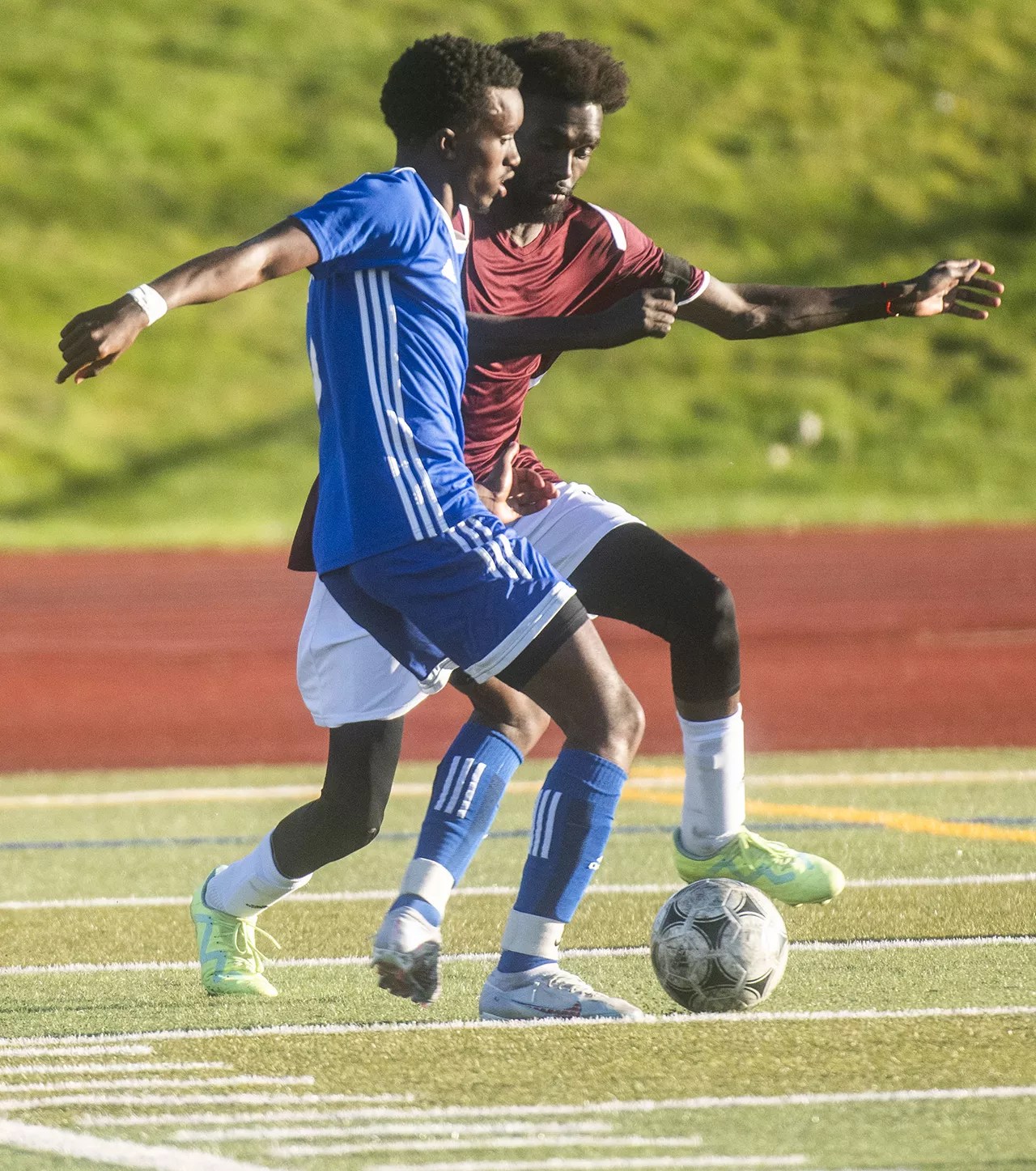
Refugees meet on a soccer field in Aurora.
Evan Semón
Finally, he was able to bring his wife to the U.S. By then, he could also apply for citizenship because he had been in the United States for five years.
Onosa worked as a petroleum engineer for several years, but because he and his wife soon had a son and a daughter, he decided to take a job driving a limo. “I needed to provide for my wife and children,” he says.
While driving his limo in 2013, a car T-boned Onosa, sending him to the hospital. While there, he earned an online MBA, and “I thought and thought to myself about starting my own business,” he recalls.
By the time he left the hospital after a long stay, he’d decided to start a medical supplies delivery business. He went from friend to friend in Aurora, talking about the business idea. Eventually, fourteen signed on for the plan.
They decided to start a “sanduk,” a Sudanese tradition in which members of a group put a portion of their earnings in a box each month until they reach a goal. “At the end of the month, I have to participate $200, like a bill,” Onosa explains. “One day we figure out we have close to $40,000 after two years. But we had a commitment: Nobody touch it.”
One of Onosa’s first steps as a business owner had been signing up for free consulting with the Aurora-South Metro Small Business Development Center, a state and federal partnership with offices in the Aurora Municipal Center.
“That was also with a lot of help from the city,” Onosa says. “For example, there were advisors, you go and figure out. They don’t help you directly, but you go and listen: ‘What’s the best business? I want to do medical transport, is that a good business?’ ‘Yeah, yeah, yeah.'”
“We are also business-friendly; we have programs helping immigrants and refugees to open businesses,” notes Gambetta, head of the city’s immigration aid group. In Aurora, 13 percent of the refugee population has started a business, compared to 9 percent of the U.S.-born population and 11.5 percent of the city’s immigrant population.
“We have immigrants and refugees working all over across the city, raising their families all over across the city.”
Onosa and his friends founded the company with $30,000, saving the rest and starting over with the sanduk to raise money for their first delivery cars. After another two years, they had two of their own cars for medical supplies.
At one point, though, revenue started to decline, and some friends pulled out their initial investments. “A lot of them, they feel like the company is not going in the right direction, so they stop: ‘I want my share,'” Onosa remembers. “We just give them the money until we get close to eleven, some of them also at the end. They said, ‘We don’t want the company, you can have it, just give us our money.'”
Finally, there was just Onosa. But he stayed on good terms with his friends. “The good thing about our community is we know each other, we trust each other, and we know, if I don’t give you the money today, I will give it to you later,” he says. “It’s a commitment.”
Today, Onosa’s business has eighteen delivery trucks. The money he earns “is the kind of money I was always trying to make for my family,” he says. “I’m happy with it.”
Aside from working, Onosa loves to coach soccer. Gambetta helped him start a soccer league in which the many African nations represented in Aurora – including Somalia, Ethiopia, Sudan and the Congo – have their own teams.
Facing off against Onosa’s Sudanese team in the finals on October 15 was the Congolese team, the African Union team. In the stands that night were Gasimba and her two young children, who watched as refugees from Sudan triumphed over those from Congo.
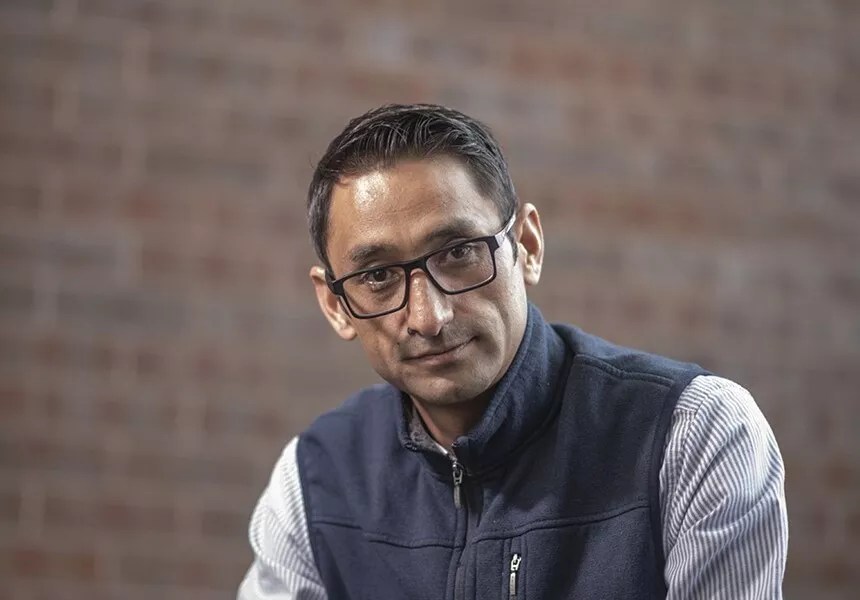
Homayoon Milad worked for the Americans in Afghanistan.
Evan Semón Photography
When Homayoon Milad arrived in Aurora in September 2021, it was late at night and cold. He couldn’t see anything in the dark. He’d come to the U.S. with his wife and three sons; the trip from Afghanistan had taken a month. They were among the last to leave as the Taliban retook control following the withdrawal of the American military that had been in the country for two decades.
Milad grew up in Kabul, where his father was in the military. His family was Shia Muslim and part of the Hazara ethnic group. Afghanistan “is a very diverse place,” he says, filled with such ethnicities as Tajiks, Afghans, Pashtos and Uzbeks, who all speak different languages.
He was still a teenager when the U.S. invaded Afghanistan. The first time the Taliban collapsed, “people were happy that a regime was going that kept people under suppression, and people were ready to embrace freedom. It was completely different,” he remembers.
Milad was eighteen when the new Afghan constitution was written in 2003. Once he had his degree in crop sciences from Kabul University, he got a job visiting more than 3,800 villages in all 34 provinces to monitor their farming needs and see how the government could help.
His experience and his fluency in Dari Persian and Pashto helped him get work in 2020 with the U.S. Institute of Peace, an organization founded by Congress for peacekeeping and conflict resolution around the world.
“I was supposed to work for all Afghans,” he remembers. “Irrespective of their school of thought, their religion, their tribal affiliation, that was my job. I was really well accepted by the community.”
Rather than asking about crops, Milad was now determining what local villages wanted to see in the way of justice to resolve conflicts with other village, provincial or federal governments. Because he was working for the U.S. government, Milad qualified for a Special Immigrant Visa, which was created in 2009 to protect Afghans and Iraqis who helped the U.S. during the two wars in the Middle East.
He began applying for his SIV before he knew that the U.S. government was going to withdraw from the country. That date was finally set for August 15, 2021. Fortunately, Milad’s SIV had been approved ten days before, but the earliest flight he and his family could get on a U.S. Air Force plane was on August 26.
As the U.S. began to withdraw, the difference “was black and white,” he recalls. The last eleven days that Milad, his wife and three sons were in Afghanistan, they saw the Taliban enter the city. “Kabul was colorful, everything was colorful, coffee shops were full, these were the signs of development. With the fall of Kabul in August 2021, people had another type of feeling – that not only a public government collapsed, but also a nation has collapsed.”
At 5:30 a.m. on August 26, Milad and his family left on one of the last planes out of Kabul. His parents and his brother were not able to accompany them to the airport. “I remember looking back at my door as I left and knowing this would be the last time I would see my home,” he recalls.
“When I left Afghanistan, all my wealth, my car, my bank account, my house, it disappeared,” he says. “But the biggest pain was I’m leaving as a person with no identity. The Afghanistan on August 14 had a flag, a three-color flag. On August 15, it had no flag. A flag is a sign of identity for a nation. We lost our flag, we lost our nation.”
Their flight took the family from Kabul to Kuwait to Spain to Washington, D.C., to Holloman Air Force Base in Alamogordo, New Mexico. Milad was numb. “I was watching that we were moving, we were traveling, but I was not feeling it,” he says.
“I was watching that we were moving, we were traveling, but I was not feeling it.”
Milad had a sister who’d been living in Aurora for four years with her husband, who was also from Afghanistan. His brother-in-law picked up Milad’s family at the Air Force base. During the ten-hour drive from Alamogordo to Aurora, “you could see a lot of nice scenery, nice views, landscapes,” Milad remembers. “I was looking to these nice sceneries and talking to my brother-in-law and talking to the family, but nothing.”
They arrived in Aurora at 8 p.m. on September 19.
“I was like a moving dead body,” Milad says. “I was breathing, but I was not feeling.”
Milad and his family were resettled in Aurora by the International Rescue Committee. While Milad searched for work, a community engagement position opened at the IRC, which called for meeting with refugees across metro Denver and helping them get adjusted as they resettled. It sounded like Milad’s old job in Afghanistan, and he got it just two months after arriving in Aurora.
But during his first year in Aurora, he still couldn’t shake that loss of feeling. “For almost one year, I was in a COVID mood,” Milad says. “No taste, no smell.”
Two things began to change that. One was getting past his probation period to earn legal status as a refugee. “Now I’m more attached to my new community. That was a strong trigger for me, which allowed me to start rebuilding my life,” he says.
The other came through his work, which is how he realized that Aurora shared a special similarity with Afghanistan: a sense of diversity and unity.
“In Afghanistan, I am a Hazara, or you are Pashto or you are Uzbek,” he says. “Here, I’m an Afghan, there’s no tribal affiliation. But I learned that the people here, they’re from Syria, or they’re Jewish, or they’re from Africa, Kenya, Sudan. People from many places, but there is a unity, which was important in Afghanistan.”

Two months after arriving in Aurora, Milad was helping other refugees.
Evan Semón
It’s important here, too. “I can start to see the results of my work,” he says. “I feel more attached to community members. They shared with me, I shared with them. We came together to support others. Those were the factors that triggered my life to feel more attached to my new beginning here in Aurora.”
He knows refugees across the metro area and insists he knows every Afghan in Aurora – more than 200, according to the city, including a handful of Christian Afghans. “We’re a close community, we go to mosque, we go to each other’s homes,” he says. “And even those who aren’t Muslim, we know.”
Milad now considers Aurora the place he will live for the rest of his life. “I have a lot of friends around the country; I’ve traveled to twelve states the last two years. I’ve gotten a lot of messages from friends asking if I want to move out of Aurora,” Milad explains. “I could rebuild my connections with USIP, with the State Department, take a higher salary, but I said no to all of that. I found my home.”
Connecting with his roots in agriculture, Milad compares his work to farming. Two years after he landed in Aurora, he wants to stay for the harvest. “It’s not out of laziness. I want to plant my seeds here and wait for the harvest,” he says. “I’m trying to harvest a lot of seeds with my community.”
Among other things, he’s planting seeds with other parents to encourage their children to consider work in politics, hoping that one day soon an Aurora election will feature the child of a refugee.
“I can never be president. We can never be president because we were born outside the U.S.,” he points out. “But our kids were born here. That’s why I tell other refugees to push their kids towards politics – senator, mayor, governor, whatever, because there they can make the difference.”